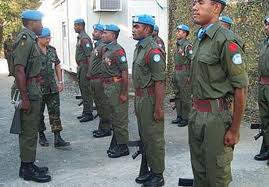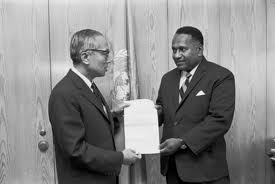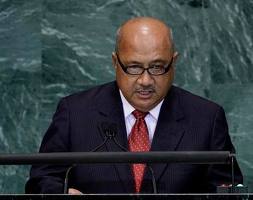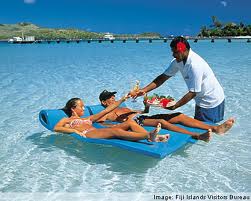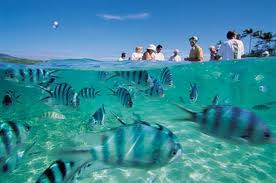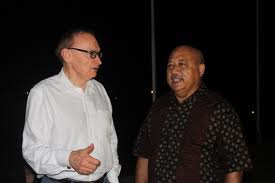Source: Grubsheet

– April 19, 2013
| An outstanding success: Voreqe Bainimarama arrives in Port Moresby (Photo:ABC) |
There’s
elation in Fijian Government circles over the highly successful outcome
of this week’s visit to Papua New Guinea by the Prime Minister, Voreqe
Bainimarama, at the head of the biggest Fijian trade and investment
mission ever to visit another country. The original aims of the visit
were ambitious enough – to lay more of the foundation for the creation
of a single, integrated market for the countries of the Melanesian
Spearhead Group. Yet the results exceeded even the most ambitious
expectations of the PM, his Foreign Minister, Ratu Inoke Kubuabola, and
the trade delegation of 65 Fijian business leaders from 47 companies.
Commodore
Bainimarama described himself as being “on a high”. And the normally
ultra-calm and measured Permanent Secretary for Trade and Industry,
Shaheen Ali, said he was “overwhelmed” by the “marvelous” outcome of the
visit. Within hours, some of the Fijian companies were already
receiving orders and entering into agreements with PNG suppliers and
distributors. And by day two of the mission, two more Fijian businesses
had registered as foreign investors in PNG. This is in addition to the
F$180-million investment by Fiji’s national superannuation fund, the
FNPF, in Bemobile – a major telecommunications provider in PNG and
Solomon Islands – and the management takeover of its operations by
Vodafone Fiji.
The
Fijian Government sees itself as equal partners with PNG in ultimately
leading the other MSG countries into an economic union to improve the
lives of every Melanesian. There’s a notable absence of rivalry of the
sort we’ve witnessed over the years in Europe, where Germany, France and
Britain have consistently maneuvered for advantage in the European
Union. As Fiji sees it, Papua New Guinea has the biggest market – seven
million people compared to around 900,000 here – plus the massive wealth
that flows from its minerals and energy sectors. And Fiji has an
established manufacturing base, a skilled and educated workforce and is
positioned at the crossroads of the Pacific.
In other words, their assets are complimentary. Each country has its particular challenges – Papua New Guinea with corruption and lawlessness and Fiji still grappling with finally putting to rest the divisions that have hampered its development since Independence. Yet there’s a strong feeling on both sides that working in tandem in a joint leadership role is the best way to improve the lives of their own citizens and their Melanesian brothers and sisters in the smaller MSG states.
In other words, their assets are complimentary. Each country has its particular challenges – Papua New Guinea with corruption and lawlessness and Fiji still grappling with finally putting to rest the divisions that have hampered its development since Independence. Yet there’s a strong feeling on both sides that working in tandem in a joint leadership role is the best way to improve the lives of their own citizens and their Melanesian brothers and sisters in the smaller MSG states.
There’s
no doubt that Melanesian solidarity generally was a big beneficiary of
this visit. As Commodore Bainimarama put it, PNG -Fiji ties go way
beyond the mutual respect and cooperation that is the traditional
benchmark of diplomacy. The peoples of both countries genuinely like
each other, enjoy each other’s company and share a vision of a stronger
Melanesia building a common economic and political future for all its
citizens. And of course, both Governments bear significant grudges
against the most dominant power in the region, Australia, which they
regard as generally arrogant, overbearing and indifferent to Melanesian
sensibilities. The same applies to New Zealand, albeit to a lesser
extent.
As
Grubsheet has written before, Australia’s mishandling of its Pacific
neighbours – and especially Fiji – is a mistake of historical
proportions. Its failure to fully engage with them, let alone comprehend
their challenges, and its propensity to prescribe and even hector, has
driven influential Pacific countries like Fiji and PNG further into each
other’s arms and the arms of others outside the region. The Australian
trade union heavies and their stooge of a Prime Minister who currently
determine Pacific policy – and the foreign affairs establishment which
implements it – seem to have little concept of Melanesian sensitivities
and protocols.
It’s well known in Suva than even the mention of Australia can trigger a surge of anger in Prime Minister Bainimarama, who feels sorely aggrieved that Canberra chose not to even sit down with him, let alone try and comprehend his reforms. During this visit, the PM kept his counsel, adhering to the diplomatic convention of not criticising another country on someone else’s soil. In fact, it was the Papua New Guineans who made unflattering public comments about Australia. PNG’s Trade Minister, Richard Maru, accused Canberra of using his country as a “dumping ground” for its goods and said it wasn’t in Australia’s interests for the Melanesian countries to become self sufficient in anything. If that was what was being said publicly, then we can be sure that the language behind the scenes would have been a lot more colourful. The shared grievances of both governments about Australia would have been fully aired.
It’s well known in Suva than even the mention of Australia can trigger a surge of anger in Prime Minister Bainimarama, who feels sorely aggrieved that Canberra chose not to even sit down with him, let alone try and comprehend his reforms. During this visit, the PM kept his counsel, adhering to the diplomatic convention of not criticising another country on someone else’s soil. In fact, it was the Papua New Guineans who made unflattering public comments about Australia. PNG’s Trade Minister, Richard Maru, accused Canberra of using his country as a “dumping ground” for its goods and said it wasn’t in Australia’s interests for the Melanesian countries to become self sufficient in anything. If that was what was being said publicly, then we can be sure that the language behind the scenes would have been a lot more colourful. The shared grievances of both governments about Australia would have been fully aired.

Certainly,
there was general astonishment about the way in which this visit
appeared to have been downplayed by Australia’s national broadcaster,
the ABC, which also has a significant presence in PNG. Aside from one
story that correctly cited a series of “historic” agreements, the rest
of the visit was generally ignored. Indeed on the first day, Radio
Australia’s current affairs program, Pacific Beat, chose to lead with an
item criticising Fiji’s constitutional process rather than give weight
to the region’s two biggest and most influential island countries
forging closer ties. It merely reinforced the notion in Fijian minds of
the ABC’s chronic bias against the Bainimarama Government and Radio
Australia as a lapdog of Canberra’s foreign policy. By any normal
journalistic standard, this was a big Pacific story of significant
interest to the populations of PNG and Fiji and, to a lesser extent,
those of Solomon Islands, Vanuatu and the Kanaks of New Caledonia, who
make up the rest of the MSG. It was buried.
Is
Australia sensitive about the fact that its so-called smart sanctions
against Fiji haven’t turned out to be smart at all? You bet. American
diplomats report that far from modifying their policies in the face of
defeat, the Australians have stepped up their efforts internationally to
isolate Fiji. Was Commodore Bainimarama’s visit a collective two-finger
salute to Australia? Well, maybe just a little. Yet the overriding
sentiment in official circles in Suva nowadays is that Australian
attitudes are irrelevant. In any event, Blind Freddy can see that Julia
Gillard’s Government is toast -with a 29 per cent primary vote in the
most recent opinion poll – and that Australian policy towards Fiji is
bound to be more realistic, if not more favourable, when the Coalition’s
Tony Abbott storms into power in the Australian election in September. A
full year out from the promised Fijian poll, Abbott and his likely
foreign minister, Julie Bishop, will have ample time to end Labor’s
vendetta and rebuild the relationship.
There
were many highpoints of this visit, not least the Bemobile signing
-Fiji’s biggest foreign investment on behalf of all Fijians through the
FNPF in one of the most dynamic sectors of the global economy-
telecommunications. The Government’s critics continually harp on about
the FNPF putting the retirement savings of ordinary Fijians at risk. Yet
with Vodafone Fiji running Bemobile, the potential to grow that
investment seems rock solid. In Fiji, there are more mobile phones than
people – a penetration rate of 105 per cent. In Papua New Guinea, the
penetration rate is 35 per cent. That’s a lot of potential customers and
a lot of mobile phones.
Among other highlights of the visit:
- · The announcement that citizens of both countries will no longer require visas to visit each other. This is on top of existing plans to achieve a seamless flow of labour between the MSG countries.
- · The provision for retired Fijian civil servants – who are obliged to vacate their jobs at 55 – to work in Papua New Guinea to boost the local skills base.
- · The plan for a permanent Fiji Trade Mission in Port Moresby and the continuation of the joint effort to break down the remaining impediments to trade and investment, with a view to developing a common market.
- Most important of all – at least in the shorter term – is the financial support Papua New Guinea has offered Fiji to conduct its election in September 2014 and introduce the first genuine parliamentary democracy in the country’s history of one-person, one vote, one value.
According
to officials travelling with Commodore Bainimarama, the PM couldn’t
believe his ears when the amount of the PNG contribution was announced
out of the blue by his opposite number, Peter O’Neill. “What did he
say?”, he asked. At first, the Ministry of Information flashed a media
release that the amount was 15-million Kina. But it soon became clear
that the fifteen was actually FIFTY. A sense of astonishment, delight
and gratitude swept the Fijian delegation and text messages lit up in
the corridors of power in Suva. More than 40-million Fijian dollars! By any standards and especially in the Pacific, it is an astonishingly generous amount.
This
contribution has sealed the Fiji-PNG relationship and laid to rest the
concerns of some that PNG was more intent on cementing its own interests
during this visit than pursuing a genuinely equal partnership. It means
that Fiji no longer requires other outside assistance to finance the
poll, and especially from those countries or groups of countries like
the European Union, which appear more interested in using the money as
political leverage than in assisting Fijians to determine their own
future. Instead of having election observers from the EU – as happened
controversially in 2006 – the Prime Minister wants election observers
from PNG and the other MSG countries. He accused the EU observers of
endorsing a “flawed” election in 2006 and said Fiji wanted an observer
group with “integrity”. This will not be music to the ears of Fiji’s
voluble EU Ambassador, Andrew Jacobs, who before the PNG announcement,
was telling people that Fiji would need to approach the EU for assistance and accept certain conditions that are now decidedly moot.
With Commodore Bainimarama having now travelled across the world to New York to chair a meeting of the G77 Plus China and the rest of the Fijian delegation making its way home, it’s clear that this visit has been an outstanding success. History may also judge it as the week that Fiji and PNG cemented their common future and came to realise more fully the potential they have – working together – to establish the MSG as the pre-eminent regional grouping and its integration as the best way to improve the lives of all Melanesians. One thing is certain. The axis of power in the Pacific is gradually shifting, whether Australia, NZ and their Polynesian client states such as Samoa like it or not.
Club Em Designs




